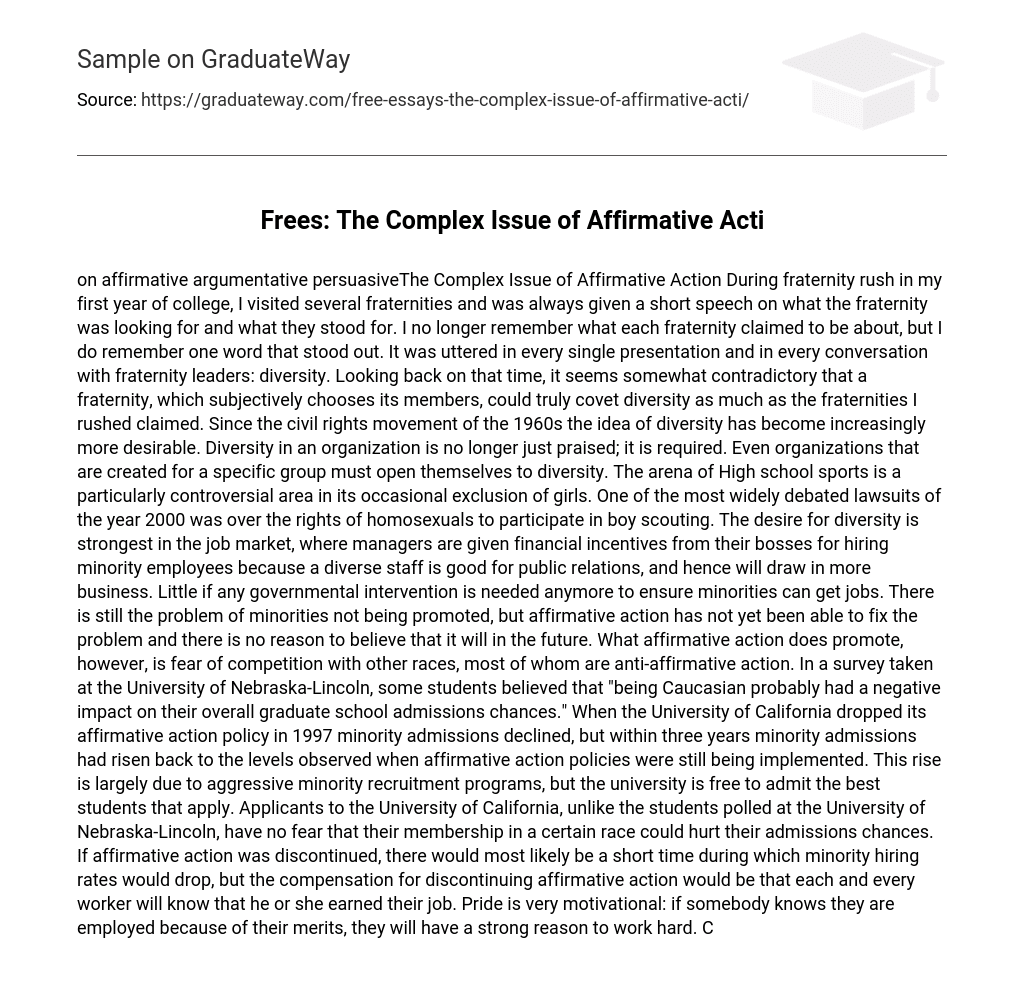on affirmative argumentative persuasiveThe Complex Issue of Affirmative Action During fraternity rush in my first year of college, I visited several fraternities and was always given a short speech on what the fraternity was looking for and what they stood for. I no longer remember what each fraternity claimed to be about, but I do remember one word that stood out. It was uttered in every single presentation and in every conversation with fraternity leaders: diversity. Looking back on that time, it seems somewhat contradictory that a fraternity, which subjectively chooses its members, could truly covet diversity as much as the fraternities I rushed claimed. Since the civil rights movement of the 1960s the idea of diversity has become increasingly more desirable.
Diversity in an organization is no longer just praised; it is required. Even organizations that are created for a specific group must open themselves to diversity. The arena of High school sports is a particularly controversial area in its occasional exclusion of girls. One of the most widely debated lawsuits of the year 2000 was over the rights of homosexuals to participate in boy scouting. The desire for diversity is strongest in the job market, where managers are given financial incentives from their bosses for hiring minority employees because a diverse staff is good for public relations, and hence will draw in more business.
Little if any governmental intervention is needed anymore to ensure minorities can get jobs. There is still the problem of minorities not being promoted, but affirmative action has not yet been able to fix the problem and there is no reason to believe that it will in the future. What affirmative action does promote, however, is fear of competition with other races, most of whom are anti-affirmative action. In a survey taken at the University of Nebraska-Lincoln, some students believed that “being Caucasian probably had a negative impact on their overall graduate school admissions chances.” When the University of California dropped its affirmative action policy in 1997 minority admissions declined, but within three years minority admissions had risen back to the levels observed when affirmative action policies were still being implemented. This rise is largely due to aggressive minority recruitment programs, but the university is free to admit the best students that apply.
Applicants to the University of California, unlike the students polled at the University of Nebraska-Lincoln, have no fear that their membership in a certain race could hurt their admissions chances. If affirmative action was discontinued, there would most likely be a short time during which minority hiring rates would drop, but the compensation for discontinuing affirmative action would be that each and every worker will know that he or she earned their job. Pride is very motivational: if somebody knows they are employed because of their merits, they will have a strong reason to work hard. Conversely, if somebody knows they were hired because of their race, they have very little reason to try to do a good job. In this way affirmative action perpetuates its own stereotype that workers aren’t hired for merit. Workers that are indeed hired because of their race have little motivation to disprove the stereotype by working hard and proving their merit.
Pride is necessary for the success of both the employee and the employer, but affirmative action eliminates the pride normally associated with holding a job. In fact, only half of African-Americans polled by the Washington Post “say blacks and other minorities should receive preference in college admissions to overcome past inequalities.” As stated by Harvey Mansfield in his speech Political Correctness and the Suicide of the Intellect, “affirmative action is the only government program that’s ashamed of itself and that cannot identify its beneficiaries.” Being associated with affirmative action efforts is insulting. Affirmative action is an issue that needs to be seriously considered. Racial discrimination still exists in the workplace, but affirmative action has not been able to fix that problem. Merely getting a job, however, is no problem to minorities anymore.
The concept of diversity has become so admired that affirmative action is unnecessary. At the same time affirmative action creates tension between the races and therefore promotes inequality and racism. Affirmative action is actually by definition racist. It gives preference to one race over another. The motivation to work hard is lost with affirmative action since there is little reason to work hard when an employee’s job is given to him because of his race.
Affirmative action is a complex issue and it has the ability to affect the lives of every single American.





